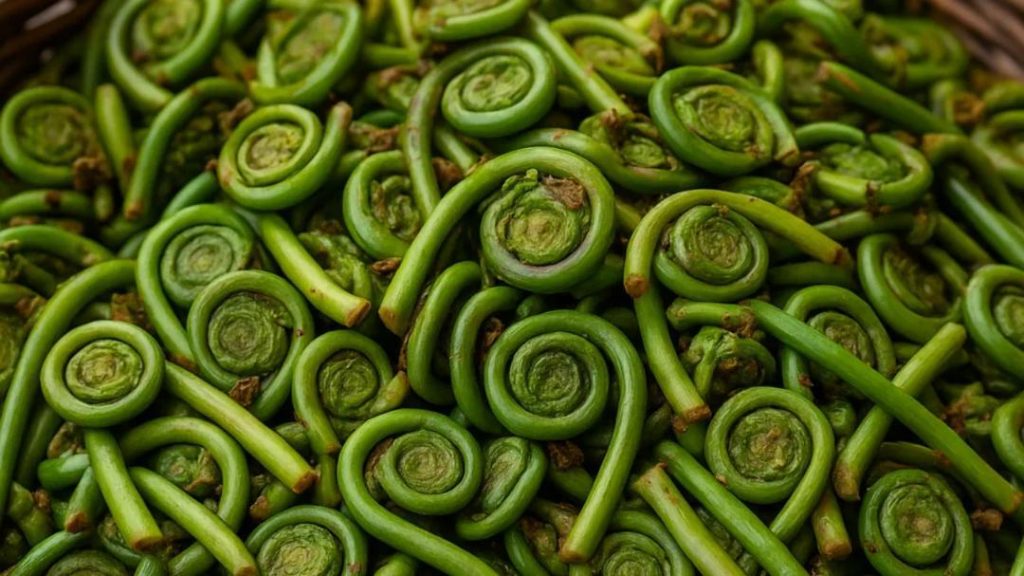
Lingad, a Monsoon Fern, Boosts Immunity and Bone Health
The Himalayas, a region of breathtaking beauty and biodiversity, is home to a plethora of unique and exotic flora. Among the many fascinating plants that thrive in this region, one species that has gained prominence in recent years is the Lingad, also known as the fiddlehead fern (Diplazium esculentum). This young, coiled shoot is foraged during the monsoon season and is a staple ingredient in many local cuisines. But beyond its unique flavor and rich tradition, Lingad has been found to possess numerous health benefits, including boosting immunity and supporting bone health.
Harvesting and Preparation
Lingad is typically harvested when it is still young and curled, before it matures and becomes fibrous and unfit for cooking. The tender shoots are then cleaned, cooked, and seasoned with a variety of spices to bring out their unique flavor. The preparation method may vary depending on the region and personal preference, but it is often sautéed with onions, garlic, and chilies to create a flavorful and aromatic dish.
Nutritional Profile
Lingad is a densely nutrient-rich food, packed with vitamins, minerals, and antioxidants. It is an excellent source of:
- Vitamin A: Essential for healthy vision, immune function, and skin health.
- Vitamin K: Crucial for blood clotting and bone health.
- Fiber: Supports digestive health and can help lower cholesterol levels.
- Antioxidants: Protects against oxidative stress and inflammation.
- Minerals: Rich in calcium, magnesium, and potassium, which are essential for bone health and overall well-being.
Health Benefits
The unique combination of nutrients in Lingad makes it an excellent food for boosting immunity and supporting bone health. Some of the key health benefits associated with consuming Lingad include:
- Boosts Immunity: The high levels of vitamins A and C in Lingad make it an excellent natural remedy for boosting immunity. It can help to protect against infections and diseases.
- Supports Bone Health: The presence of vitamin K, calcium, and magnesium in Lingad makes it an excellent food for supporting bone health. It can help to strengthen bones and reduce the risk of osteoporosis.
- Antioxidant Properties: The antioxidants present in Lingad can help to protect against oxidative stress and inflammation, which are associated with various chronic diseases.
- Anti-Cancer Properties: Some studies have suggested that Lingad may have anti-cancer properties, although more research is needed to confirm this.
Traditional Use
Lingad has been a staple ingredient in many traditional cuisines in the Himalayas for centuries. It is often used in soups, stews, and stir-fries, and is considered a delicacy in many local communities. The unique flavor and texture of Lingad make it a popular ingredient in many traditional dishes, including:
- Nepali Cuisine: Lingad is a staple ingredient in Nepali cuisine, where it is often used in soups and stews.
- Tibetan Cuisine: In Tibetan cuisine, Lingad is used in a variety of dishes, including stir-fries and soups.
- Himalayan Cuisine: Lingad is a popular ingredient in many Himalayan cuisines, including those of Ladakh, Sikkim, and Bhutan.
Conclusion
Lingad, the wild fiddlehead fern, is a unique and exotic ingredient that is not only rich in flavor but also packed with nutrients and health benefits. From boosting immunity to supporting bone health, Lingad is an excellent addition to a healthy diet. With its rich tradition and cultural significance, Lingad is an ingredient that is not only delicious but also steeped in history and heritage. Whether you are a foodie or a health enthusiast, Lingad is definitely worth trying.
Source:



